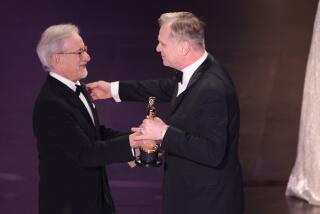If memory serves …
Award season lends itself to prognostication from all corners, from venerable film critics to Vegas oddsmakers and all the dry cleaners, masseurs and baristas in between. But we here at The Envelope like to look backward before making our best picture predictions. By examining what has triumped in the past, we can see how — or if — the current crop of freshly minted nominees aligns in story, theme or form to a tried and true Oscar winner. And as it happens, all 10 match up with a champ, if you’ll allow a stretch or two in the comparisons, because as original as this year’s top films are, they still embody universal elements that have been with us since storytelling began.
“True Grit”: Like 1992’s “Unforgiven,” this unconventional western features revenge, rewards, an aging gunman with a drinking problem, open plains and big sky. In its stars, Jeff Bridges and Clint Eastwood, the camera found iconic faces carved from the prairie. The fate of young Mattie Ross (Hailee Steinfeld) and half the rest of the cast of “Grit” could be summed up by Eastwood’s line: “Deserve’s got nothing to do with it.”
“The Fighter”: Let’s see, there’s a down-on-his-luck boxer from a poor neighborhood, facing impossible odds in the ring yet buoyed by the love of a good woman. There’s even an uplifting run through the streets of Philadelphia — I mean, Lowell, Mass. Does any of that ring a Liberty Bell? In 1976, “Rocky” had Burgess Meredith in his corner; Christian Bale as Dicky Eklund is just as indelible.
“127 Hours”: For the breathtaking vistas, the perilous fall and the sheer force of will in an epic tale of man versus nature, one must turn to the other real-life story told in “The Man Who Skied Down Everest.” 1975’s documentary winner followed skier Yuichiro Miura up and down Mt. Everest in a journey marked by tragedy and harrowing beauty. His skiing feat soon careened out of control, not unlike the canyoneering trip by Aron Ralston, portrayed by James Franco in “127 Hours.” Audiences watched breathlessly as each man headed toward almost certain death. No word on whether anyone fainted watching the documentary, though.
“The King’s Speech”: “Chariots of Fire” (1981) comes to mind, and not just because it hails from England and is packed with all those plummy accents. In each film, a pair of men from very different backgrounds face formidable obstacles to their noble goals. In the process, they forge a friendship that benefits them both. One has an unshakable belief in his mission, the other a strong woman giving him unshakable support. In both true stories, history makes heroes of them all.
“Inception”: The only other fantastical film with elaborate special effects to win an Academy Award was 2003’s “The Lord of the Rings: The Return of the King,” but setting aside the monumental effects and focusing instead on the story reveals “Inception” as a much darker version of 1973’s “The Sting.” A team of attractive con artists is assembled and an elaborate structure put in place to beat a rich man at his own game. In each tale, the characters are as interested in the complicated job for the challenge of it — even the redemption — as for the monetary rewards.
“Winter’s Bone”: This indelible little indie could be titled “No Country for Young Girls.” Like 2007’s winner, “No Country for Old Men,” the story takes us on a quest that leads through some strange territory. Casual brutality and moments of horror and humor abound. And John Hawkes’ Teardrop Dolly is as bizarre and fascinating, though not nearly as evil, as Javier Bardem’s Anton Chigurh.
“The Kids Are All Right”: Think back to 1983’s winning “Terms of Endearment.” See the loving familial dysfunction, the funny story that turns surprisingly sad and the often troublesome interloping of men. All serve to highlight what is, ultimately, a love story between two women. Yes, Debra Winger and Shirley MacLaine played mother and daughter, but their bond in “Terms,” like that embodied by Julianne Moore and Annette Bening as partners in “Kids,” was certainly stronger than any other relationship in their respective films.
“Black Swan”: With all that intrigue, double-dealing, paranoia and backstabbing, the battle between the two ballerinas has been compared to 1950’s winner, “All About Eve,” another monumental catfight. But with all that glorious classical music, and the mystery and madness swirling around — even a possible murder — it’s even more reminiscent of the artistic thriller “Amadeus,” 1984’s winner.
“The Social Network”: Like Paul Nash (Russell Crowe) in 2001’s “A Beautiful Mind,” Mark Zuckerberg (Jesse Eisenberg) is a brilliant young man isolated in large part by the way his mind works. They’re both certainly better with numbers than with people. The movies even share a dash of controversy concerning their true-life protagonists and issues of factuality. For good measure, throw in a dash of witty repartee à la “It Happened One Night” (1934’s winner) and a variety of points of view akin to “Rashomon” (1951 foreign-language film honorary award winner) and set to simmer.
“Toy Story 3”: No animated feature has won the best picture category, so close associations are impossible. But 1968 winner “Oliver!” has some colorful similarities. In both tales, innocent characters have been used and tossed aside by a callous society. Horrible ordeals must be overcome in order to get back home to safety. Little Bonnie’s home is as warm and caring to Woody as Mr. Brownlow’s is to Oliver, while Lotso is as coldhearted as Sikes. And through every hardship, Woody’s devotion to Andy is so determined that if you listen very hard, you can almost hear him singing “As Long as He Needs Me.”
More to Read
The biggest entertainment stories
Get our big stories about Hollywood, film, television, music, arts, culture and more right in your inbox as soon as they publish.
You may occasionally receive promotional content from the Los Angeles Times.










